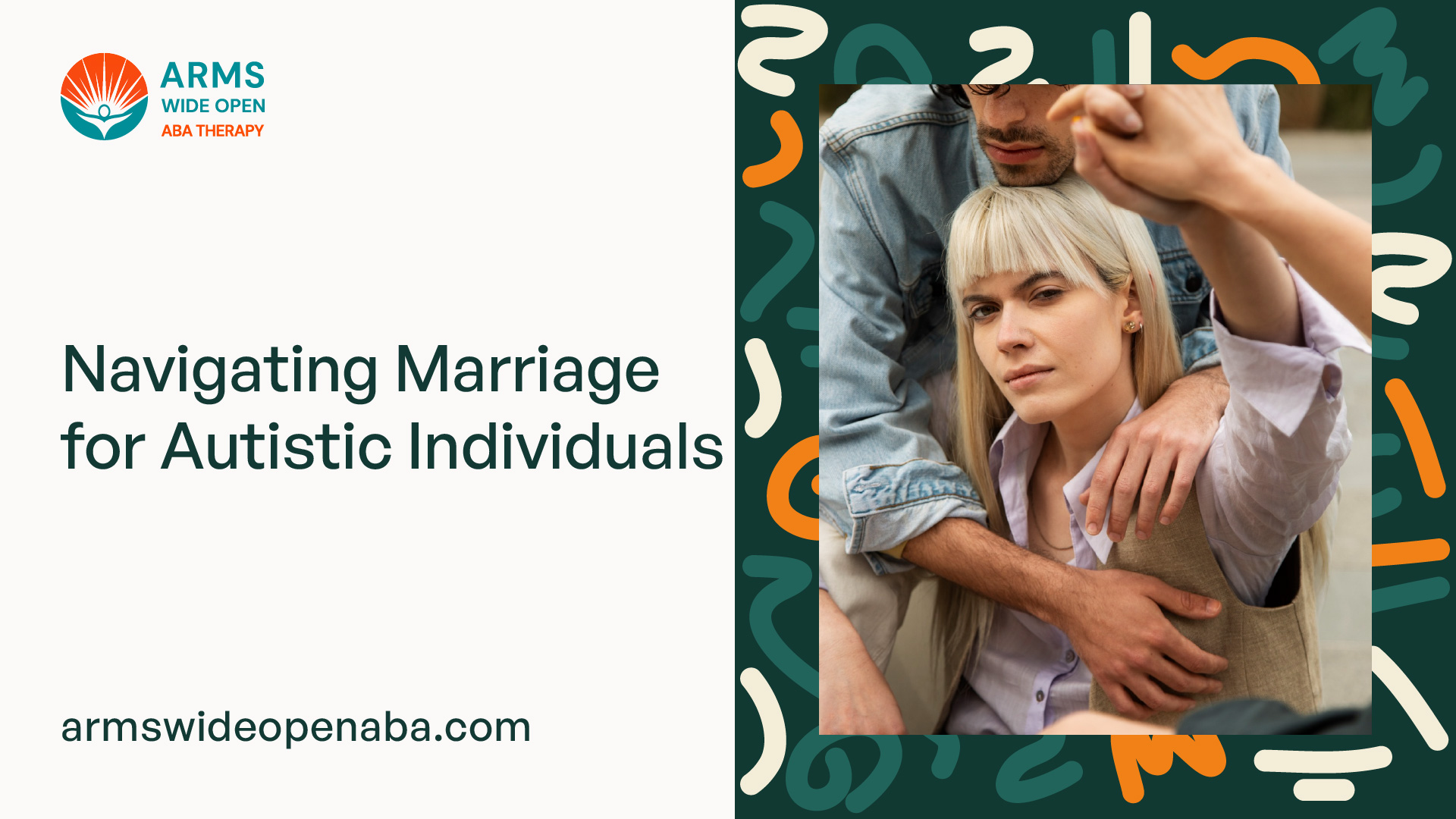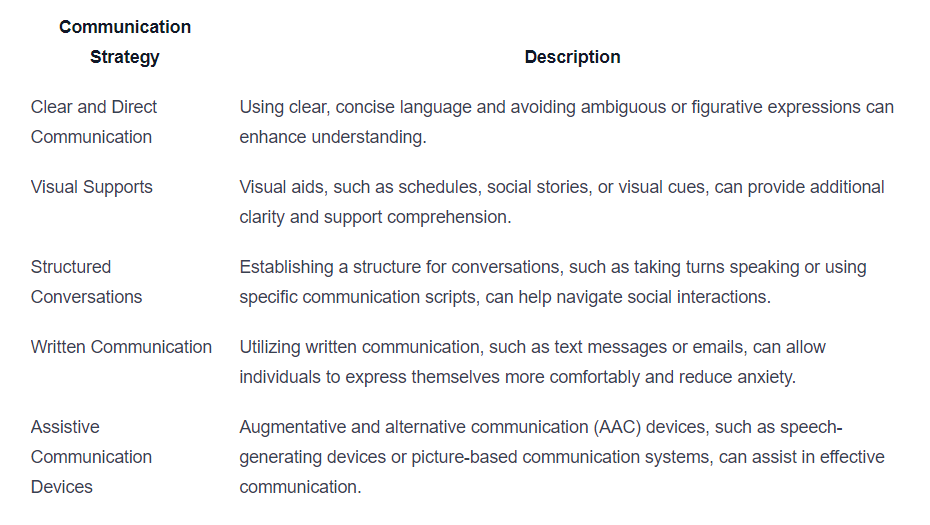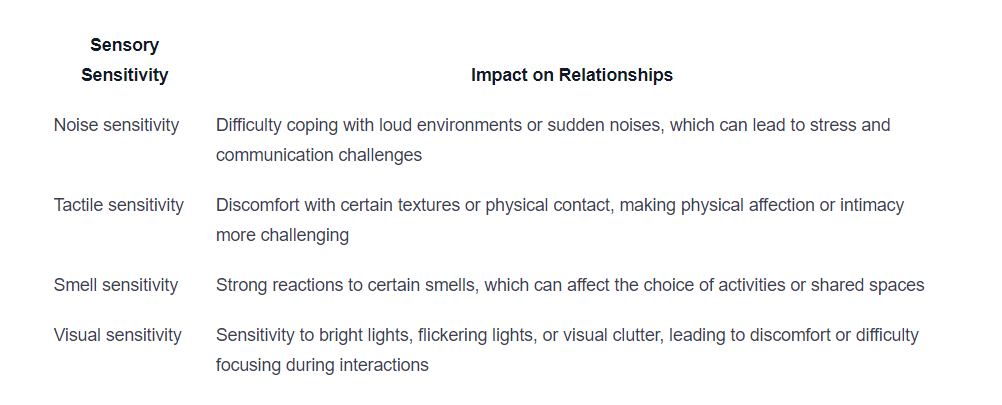Navigating Marriage for Autistic Individuals
Discover the power of love and commitment in autistic relationships. Debunking myths and exploring the unique challenges of marriage for autistic individuals.

Autism and Relationships
Navigating relationships can be both challenging and rewarding for individuals on the autism spectrum. It is important to dispel common myths about autism and marriage and understand the unique challenges that autistic individuals may face in relationships.

Dispelling Myths about Autism and Marriage
There are several misconceptions surrounding autism and marriage that need to be addressed. Contrary to popular belief, autistic individuals can and do get married. The ability to form deep and meaningful connections is not limited by one's neurodivergence. Autistic individuals are capable of experiencing love, affection, and commitment, just like anyone else.
Understanding the Unique Challenges
Autistic individuals may encounter unique challenges that can impact their relationships. These challenges can vary from person to person, as autism is a spectrum disorder that manifests differently in each individual. Some common areas where challenges may arise include:
Challenges in Autistic Relationships
Differences in communication and social interaction styles
Sensory sensitivities and their impact on daily life
Difficulties with emotional regulation and understanding
Need for routine and predictability
Understanding and addressing these challenges can help foster healthier and more fulfilling relationships for autistic individuals and their partners. By embracing neurodiversity and promoting empathy, it is possible to create a supportive and inclusive environment where both partners can thrive.
In the following sections, we will explore the power of love and commitment in autistic relationships, effective communication strategies, navigating sensory sensitivities, and seeking professional support. By gaining a deeper understanding of these aspects, we can enhance our relationships and create a stronger bond with our autistic loved ones.
Love and Commitment
Love and commitment are fundamental aspects of any successful marriage, including those involving autistic individuals. While there may be unique challenges, autistic relationships can thrive on the power of love and the strong commitment between partners.
The Power of Love in Autistic Relationships
Love knows no boundaries, and this holds true for autistic individuals as well. Autistic people are capable of experiencing deep emotions and forming meaningful connections with their partners. Love in autistic relationships can be just as passionate, fulfilling, and enduring as in neurotypical relationships.
Autistic individuals often have unique perspectives and ways of expressing love. They may show affection through actions, gestures, or shared interests, rather than relying solely on verbal expressions. It's important for partners to understand and appreciate these different forms of love, fostering a strong emotional bond.
The Role of Commitment in Autistic Marriages
Commitment plays a pivotal role in the success of any marriage, and autistic marriages are no exception. Autistic individuals are fully capable of making long-term commitments and maintaining healthy, fulfilling relationships.
Autistic individuals often exhibit traits such as loyalty, dedication, and honesty, which can contribute to the strength of their commitment. They may approach marriage with a deep sense of responsibility and a strong desire to support and care for their partner. This unwavering commitment can provide a solid foundation for a lasting and loving marriage.
In fact, research has shown that autistic individuals can have successful marriages, with divorce rates similar to or even lower than those of neurotypical couples. This dispels the misconception that autistic individuals are unable to form and sustain long-term romantic relationships.
Building a successful marriage requires understanding, patience, and a willingness to adapt to each other's needs. Autistic individuals and their partners can work together to navigate the unique challenges they may face, fostering a relationship built on love, trust, and shared commitment.
By recognizing the power of love and the importance of commitment, autistic individuals and their partners can forge strong and rewarding marriages. With open communication, mutual support, and a deep understanding of each other's strengths and challenges, autistic relationships can thrive and bring immense happiness to both partners.
Communication and Understanding
Effective communication is vital in any relationship, and this holds true for autistic individuals as well. While autism may present some challenges in communication, there are strategies that can help foster understanding and empathy within relationships.
Effective Communication Strategies for Autistic Individuals
Autistic individuals may have unique communication styles and preferences. It's essential to find strategies that work best for each individual and facilitate effective communication. Here are some approaches that can be helpful:

Building Empathy and Understanding in Relationships
Empathy and understanding are crucial elements of any successful relationship, including those involving autistic individuals. It's essential for both partners to make an effort to understand each other's perspectives and experiences. Here are some ways to foster empathy and understanding:
- Active Listening: Actively listening to one another, without interruptions, can create a safe and supportive environment for communication.
- Perspective-Taking: Encouraging both partners to put themselves in each other's shoes and consider their unique experiences and viewpoints.
- Education: Educating oneself about autism and its characteristics can help develop a better understanding of an autistic partner's needs and challenges.
- Patience and Flexibility: Recognizing that communication styles may differ and being patient during conversations can promote a sense of understanding and mutual respect.
- Open and Honest Dialogue: Encouraging open and honest communication about feelings, needs, and concerns can strengthen the relationship and foster empathy.
By employing effective communication strategies and cultivating empathy and understanding, autistic individuals and their partners can build strong and fulfilling relationships. It's important to remember that every individual is unique, and finding the communication approach that works best for both partners is key to nurturing a loving and supportive connection.
Navigating Sensory Sensitivities
Living with autism often comes with heightened sensory sensitivities, which can have a significant impact on relationships. Understanding and addressing these sensitivities is crucial for creating a supportive environment for autistic individuals and their partners.
Sensory Sensitivities and their Impact on Relationships
Autistic individuals may experience sensory sensitivities that can range from heightened sensitivity to certain sounds, textures, smells, or visual stimuli. These sensitivities can lead to discomfort, anxiety, or even sensory overload, making it challenging to navigate daily life, including relationships.
It's important to recognize that sensory sensitivities can vary greatly from person to person, and what may be overwhelming for one individual may not affect another in the same way. Some common sensory sensitivities that autistic individuals may experience include:

Understanding and respecting these sensitivities is vital for maintaining a healthy and supportive relationship. Open communication, patience, and flexibility can go a long way in accommodating sensory needs and ensuring that both partners feel understood and valued.
Creating a Supportive Environment
Creating a supportive environment involves making adjustments and accommodations to minimize sensory triggers and promote well-being in the relationship. Here are some strategies that can help:
- Identify triggers: Work together to identify specific sensory triggers that may cause discomfort or distress. This could involve keeping a journal or having open conversations about triggers and their impact.
- Communication and compromise: Establish open lines of communication to discuss sensory concerns and find compromises that work for both partners. This may involve finding quiet spaces to retreat to, using noise-canceling headphones, or agreeing on a sensory-friendly routine for shared activities.
- Designing the physical environment: Create a calming and sensory-friendly space at home by reducing clutter, using soft lighting, and incorporating elements that promote relaxation and comfort.
- Establishing routines: Consistency and predictability can be comforting for autistic individuals. Establishing routines and providing advance notice for changes can help reduce anxiety and provide a sense of security.
- Educate and involve loved ones: Educate family members and close friends about sensory sensitivities and how they can support the relationship. Encourage their understanding and cooperation when it comes to creating a supportive environment.
By acknowledging and addressing sensory sensitivities, couples can cultivate an environment that promotes understanding, respect, and mutual support. Remember, every individual is unique, and finding the right strategies may require patience and ongoing communication. Together, couples can navigate sensory sensitivities and build a strong, nurturing relationship.
Seeking Professional Support
When navigating the complexities of marriage as an autistic individual or being in a relationship with someone on the autism spectrum, seeking professional support can be immensely beneficial. Marriage is a significant commitment that requires open communication, mutual understanding, and a willingness to adapt and grow together. However, the unique challenges faced by autistic individuals and their partners can sometimes lead to misunderstandings, frustration, and even feelings of isolation.
This is where professional support comes in. Marriage counseling and support groups provide valuable resources and guidance for autistic couples and their partners. These services are designed to help couples build stronger, healthier relationships by fostering effective communication, problem-solving skills, and emotional connection.
In marriage counseling, a trained therapist works with the couple to identify and address the specific challenges they face. This may include developing strategies for managing sensory sensitivities, improving social communication, and finding ways to express affection and intimacy that work for both partners. The therapist can also help the couple navigate any misunderstandings or conflicts that arise due to differences in communication styles or social expectations.
Support groups, on the other hand, provide a safe and supportive environment where autistic individuals and their partners can connect with others who share similar experiences. These groups often focus on specific topics, such as managing sensory overload, navigating social situations as a couple, or raising children together. By sharing their stories and learning from one another, participants can gain valuable insights, practical tips, and a sense of belonging.
It's important to note that seeking professional support is not a sign of weakness or failure. Instead, it demonstrates a commitment to nurturing and strengthening the relationship. Whether you are an autistic individual or in a relationship with someone on the spectrum, don't hesitate to reach out for help when needed. With the right support and resources, autistic couples can build loving, fulfilling marriages that celebrate their unique strengths and differences.
Marriage Counseling for Autistic Couples
Marriage counseling offers a safe and supportive environment for autistic couples to address challenges, improve communication, and strengthen their relationship. These counseling sessions are typically conducted by licensed therapists or counselors experienced in working with individuals on the autism spectrum. They provide a non-judgmental space where couples can openly discuss their concerns and work towards finding solutions.
During marriage counseling, various therapeutic techniques and strategies may be employed to address specific issues. These may include:
- Improving Communication: Therapists may focus on enhancing communication skills, teaching effective listening techniques, and providing tools to express emotions and needs more clearly.
- Understanding and Empathy: Couples may be guided through exercises to develop empathy and better understand each other's perspectives, fostering a deeper connection and mutual understanding.
- Conflict Resolution: Therapists can help couples develop healthy approaches to resolving conflicts, teaching techniques for effective problem-solving and compromise.
Support Groups and Resources for Autistic Individuals and their Partners
Support groups play a crucial role in providing a sense of community and understanding for autistic individuals and their partners. These groups can offer a platform to share experiences, seek advice, and gain support from others who have similar lived experiences.
In addition to support groups, there are various resources available that cater specifically to autistic individuals and their partners. These resources can provide valuable information, guidance, and practical tips on navigating relationships and addressing the unique challenges that may arise. Online forums, books, articles, and websites dedicated to autism and relationships can serve as valuable sources of knowledge and support.
It's important to note that while seeking professional support and utilizing resources can be immensely helpful, each individual and couple's needs are unique. It's crucial to find professionals and resources that align with your specific circumstances and goals.
By seeking professional support through marriage counseling and engaging with support groups and resources, autistic individuals and their partners can find guidance, validation, and strategies to foster stronger and healthier relationships. It's a testament to the power of seeking help and the commitment to nurturing love and understanding within the context of autism.
Sources
https://www.crossrivertherapy.com/autism/do-autistic-people-get-married
https://www.autismspeaks.org/blog/autism-and-marriage
https://medium.com/@TheBlueParachute/do-autistic-people-get-married-1e25f4ee8fa8
Similar articles
We’re here to help you

Our team is here to assist you in this process. Contact us for any assistance.
it’s easy to apply
We Accept Most Insurances
Our in-network insurance partnerships make ABA therapy more accessible to families throughout our service areas.







Our Insurance Process
We'll request your insurance details to help us verify your plan's coverage for ABA therapy. Once we've received this information, we'll walk you through your benefits, including copayments, deductibles and out-of-pocket maximums, so you know what to expect in advance.
Our team will then handle the preauthorization and all the necessary paperwork.
.svg)





















.jpeg)


































.jpeg)




.jpeg)







.jpeg)











.jpeg)
















